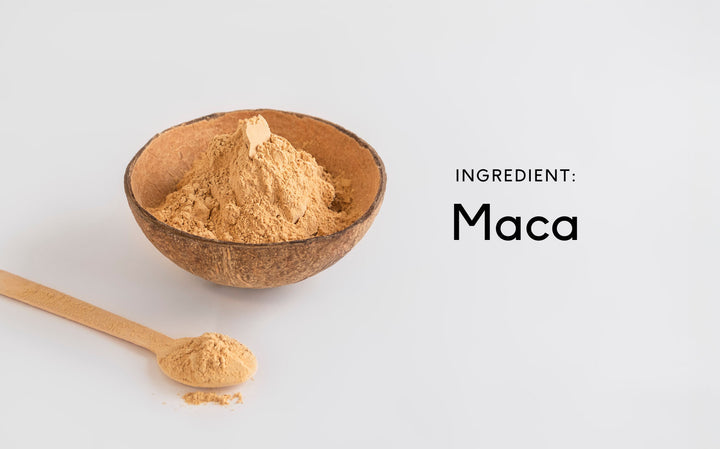Learn About Vitamin B6 in 5 Minutes
Table of contents

What is vitamin B6?
Pyridoxine, or vitamin B6, is an important part of the vitamin B complex. Like other B vitamins, pyridoxine helps your body process energy, and this nutrient is also involved in various cardiovascular, neurological, and reproductive functions.
- Improves mood and prevents neurodegenerative conditions
- Prevents anemia by helping your body produce more hemoglobin
- Reduces your risk of heart attack by preventing your veins from clogging
- Can reduce the nausea you experience when you’re pregnant
Why we love vitamin B6
Vitamin B6 is one of the most impressive B vitamins. Along with the other vitamins in the B complex, pyridoxine protects your body in a variety of ways, but vitamin B6 goes above and beyond to deliver some truly amazing results that can drastically improve your health.
By boosting neurotransmitter activity in your brain, vitamin B6 fights back against psychological conditions like depression and bipolar disorder. This essential nutrient appears to prevent the energy-sucking symptoms of anemia, and it also boosts your cardiovascular health by clearing out bad cholesterol. When all’s said and done, vitamin B6 is one nutrient that you definitely don’t want to leave out of your diet.
Vitamin B6 goes above and beyond to deliver some amazing health benefits, which is why Feel Multivitamin includes 5mg of Vitamin B6, 357% of your daily recommended intake.
Unbelievable benefits of vitamin B6
As we were making Feel, we were stunned by the incredible benefits of vitamin B that research scientists have discovered. Here’s a small sampling:
Neurological Benefits
The neurotransmitters dopamine, serotonin, and gamma-aminobutyric acid (GABA) play critical roles in regulating your mood, and vitamin B6 is a crucial component in these chemical messengers.
Feel Focus includes 20mg of Vitamin B6, 1428% of your daily recommended intake.
Research has linked the non-essential amino acid homocysteine to depression, and vitamin B6 reduces the levels of this harmful amino acid throughout your body.
When you don’t have enough vitamin B6 in your system, you’re twice as likely to get depressed. Even though it doesn’t appear that vitamin B6 directly treats depression, science suggests that you can reduce your risk of being depressed by supplementing with the pyridoxine contained in Feel.
Homocysteine is also an indicator of Alzheimer’s disease, so when you consume enough vitamin B6, you reduce your risk of developing this neurodegenerative disease. Pyridoxine also appears to reduce the symptoms and progression of Alzheimer’s in ill patients.
The role of vitamin B6 in producing neurotransmitters may also help with the symptoms of premenstrual syndrome (PMS). One study found that women who take vitamin B6 daily are less likely to report common PMS symptoms such as irritability and depression.
Anemia Benefits
Vitamin B6 helps your body produce hemoglobin, which supports its use as an anemia treatment. When you’re deficient in pyridoxine, you’re more likely to become aneamic, and people who are at risk of developing anemia can help prevent this condition by supplementing with vitamin B6.
Cardiovascular Benefits
When you have low vitamin B6 levels in your body, you’re more likely to develop coronary artery disease. It appears that this vitamin reduces cholesterol levels, and since elevated homocysteine levels cause a variety of kinds of heart disease, the elimination of this amino acid with pyridoxine decreases your risk of developing these conditions.
Pregnancy Benefits
Many women suffer from intense nausea when they’re pregnant. While some people write this off as simple morning sickness, the symptoms of this condition can be debilitating for some pregnant women. Thankfully, pyridoxine appears to reduce nausea during pregnancy.
Feel Pregnancy contains 10mg of Vitamin B6 (pyridoxal-5-phosphate), which is the body-ready form of B6 for enhanced absorption.
Is vitamin B6 water-soluble or fat-soluble?
B6 vitamin is naturally water-soluble. Therefore, this nutrient dissolves quickly, and it doesn’t stay in your body for very long.
Where can vitamin B6 be found naturally?
Luckily for people who prefer meat-free diets, vitamin B6 is plentiful in chickpeas, and also is one of the only B vitamins to be present in fruit. Beef liver is a second most plentiful source of this vitamin.
5 foods/drinks containing vitamin B6
1. Chickpeas 55% DV per 1 cup or 128g
2. Beef liver 45% DV per 85g
3. Bananas 20% DV per 1 medium banana
4. Avocados 30% DV per 1 avocado
5. Mangoes 12% DV per 1 cup
What is the recommended daily intake for vitamin B6?
The scientists at the National Institute of Health (NIH) have determined that adult men and women should consume 1.3mg of pyridoxine per day. This recommended daily amount (RDA) jumps to 1.7mg in men and 1.5mg in women for adults 51 or older, and women who are lactating or pregnant should consume about 2mg of pyridoxine per day.
What to consume to get a full daily dose of vitamin B6?
Chickpeas - around 1 cup or 220g
Beef liver - round 170g
Bananas - around 5 medium bananas
Avocados - around 3 avocados
Mangoes - around 8 cups
Can you absorb enough of vitamin B6 from food?
Vitamin B6 is relatively plentiful in a variety of plant and animal sources, and this nutrient is also available in enriched grains and cereals. However, many of the foods in which pyridoxine is most plentiful aren’t a part of most diets, which means that supplementation might be necessary to take in adequate levels of this nutrient.
Why is vitamin B6 necessary for your body?
Vitamin B6 is a coenzyme that’s involved in over 100 enzymatic processes in your body. This nutrient mainly helps your proteins metabolise correctly; without enough vitamin B6, your vital proteins might act sluggishly or burn out too quickly. Pyridoxine improves your overall health and well-being by helping your metabolic processes proceed smoothly.
Functions of vitamin B6
Cardiovascular functions: Vitamin B6 helps prevent anemia by assisting in the uptake of dietary iron. This nutrient also prevents coronary artery disease, and it reduces your levels of bad cholesterol.
Neurotransmitter production: Pyridoxine is necessary for the production of gamma-aminobutyric acid (GABA), dopamine, and serotonin, which means your neurological well-being will suffer if you don’t consume enough of this nutrient.
Morning sickness reduction: Consuming vitamin B6 reduces the symptoms of morning sickness in pregnant women.
Symptoms of vitamin B6 deficiency
Skin Rashes
Deficiency in vitamin B6 results in a variety of different topical conditions. Symptoms include dry, rash-covered skin, cracked lips, sore mouth, and sore tongue.
Neurological Dysfunction
Pyridoxine deficiency can cause changes in your mood, and it can also cause fatigue or insomnia. Worst of all, becoming deficient in this nutrient can even cause seizures.
Immune Weakness
If you keep getting sick or your body has trouble healing small wounds, you might be deficient in vitamin B6.
How long do you need to take vitamin B6 to start experiencing it’s benefits?
As a water-soluble nutrient, vitamin B6 is absorbed quickly, and it doesn’t take long before you will start noticing the beneficial effects of this vitamin. Positive benefits may be seen within one week.
Consistency is key and our research recommends taking your Feel supplements for at least 3 months to allow your body to adjust and provide the desired benefits.
How long does it take for your body to digest/absorb vitamin B6?
Like all vitamins in the B-complex, pyridoxine has a remarkable efficient absorption rate. Unless your body’s ability to absorb vitamins is compromised, you should be able to absorb close to 100% of the vitamin B6 you ingest.
How long does vitamin B6 stay in your body after you take it?
Vitamin B6 doesn’t build up in your tissues. Therefore, your body excretes this nutrient within about 24 hours.
Is vitamin B6 an antioxidant?
The role of vitamin B6 as a direct antioxidant is hotly contested within the medical science community. However, it’s clear that the beneficial effects of this nutrient at least indirectly reduce oxidative stress and inflammation throughout your body.
Can you overdose on vitamin B6? What are the effects?
While a one-time overdose of vitamin B6 won’t cause any long-lasting effects, consuming too much of this nutrient over a long period of time can be disastrous. Long-term pyridoxine overdose symptoms include sensory neuropathy, which is a type of nervous system breakdown that causes pain in your extremities and difficulty walking. To avoid these symptoms, stick to the safe quantities of pyridoxine we include in Feel.
Does vitamin B6 dissolve, flush out, or build up in the body?
Under normal circumstances, your body flushes out all the vitamin B6 you consume. In case of repeated overdose however, pyridoxine might start to build up in your liver, kidneys, and other organs.
Can you take vitamin B6 during a diet?
Consuming your RDA of vitamin B6 doesn’t interfere with any dietary restrictions.
Are there synthetic forms of vitamin B6?
Most types of dietary vitamin B6 are synthetic. The only type of natural vitamin B6 available is the type of pyridoxine present in food.
Why might synthetic forms of vitamin B6 be better?
Synthetic forms of vitamin B6 are inexpensive to produce, which makes this nutrient readily available to consumers.
Absorption rate of synthetic vitamin B6
Some research indicates that food-based forms of vitamin B6 might be stored better in your body. However, this apparent benefit could also increase your chances of overdosing on pyridoxine.
Why might natural forms of vitamin B6 be better?
Natural vitamin B6 might accumulate better in your body, but it’s hard to source the vitamin B6 you need from natural food sources.
How to take vitamin B6
You can get all the vitamin B6 your body needs from food or supplements.
Vitamin B6 trends in medicine
Recently scientists found that ingesting high quantities of vitamin B6 can increase your risk of bone fracture. Apparently, women who consume significantly more than their RDA of this vitamin are more prone to bone fractures after menopause, which simply underscores the importance of only ingesting reasonable, safe amounts of each essential nutrient.
Why everyone should be taking WeAreFeel supplements
Here at WeAreFeel, we understand that there's a fine line between an effective supplementation and supplementation which can have side effects. Seeing the amount of supplements out there with extremely high doses of vitamins and nutrients, we were inspired to create our revolutionary multivitamin Feel.
When it comes to vitamins and minerals, more isn’t always better, which is why we stick to the basics with Feel and only include the amount of vitamin B6 we know your body can handle safely. Instead of making crazy dietary changes or risking pyridoxine overdose, get the perfect amount of vitamin B6 for your body with Feel!
Here’s the Proof
- B6-responsive disorders: a model of vitamin dependency.
- Review of the role of hyperhomocysteinemia and B-vitamin deficiency in neurological and psychiatric disorders--current evidence and preliminary recommendations
- Vitamin B6 is associated with depressive symptomatology in Massachusetts elders.
- Homocysteine as a predictor of cognitive decline in Alzheimer's disease.
- Preventing Alzheimer's disease-related gray matter atrophy by B-vitamin treatment.
- Pyridoxine (vitamin B6) and the premenstrual syndrome: a randomised crossover trial.
- Vitamin B6 deficiency and anemia in pregnancy.
- Low pyridoxal 5'-phosphate is associated with increased risk of coronary artery disease.
- Pyridoxine for nausea and vomiting of pregnancy: a randomised, double-blind, placebo-controlled trial.













































 Back
Back





